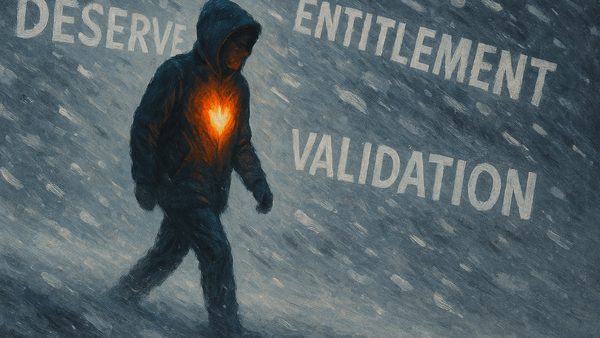Do You Truly Know Why You Have Chosen Your Partner?
Being oblivious to your intentions leads to conflict and suffering. Having them aligned with your partner's leads to stability and prosperity.

Do you truly know why you have chosen your partner? Because if not you should find out. Now.
A lot of people in all kinds of relationships - especially intimate ones - are not truly clear about the reasons they are committed in that specific setting. Very often we tend to assume the projection of what society defines as a morally acceptable relationship.
Why is that an issue? If one is not truly clear on his reasons and intentions, he will not only deceive himself but also his partner about the essence and the predominant direction of their venture.
The Delusion of the Ideal Morally Acceptable Relationship
The societal pressure is high. Movies, religion, and expectations from family and friends. They all seem to urge the display of an idealized relationship concept that follows specific acceptable rules and is based on specific acceptable virtues. For instance, the most common form of idealized relationship is the one in which “the partners love each other”.
By committing to a new relationship we are often led to assume these societally carved rules and virtues as our own even if they don’t represent our highest individual truth. The very moment we commit, we betray ourselves, creating friction between the mental concept and the actual bodily experience. This leads to a plethora of unfavorable consequences:
- To cope with the resulting mental friction we become prone to disconnect from our bodies, leading to tension, blocked energy centers, and a reduced capacity to process emotions; just to name a few.
- As another more conscious coping mechanism we become prone to use societally accepted drugs to numb our sensory experience to ease the friction.
- Deceiving your partner about your true intentions and virtues as an inevitable consequence of deceiving yourself ultimately is an act of dishonesty and untruthfulness, which is the surest way to a breakup.
What Relationships Are Founded On
Humans have many different reasons why they commit to relationships. May it be the need for security or sexual intimacy, social status, self-validation, comfort, loneliness, financial advantages, business purposes, power, fear, guilt, a lack of options, or the pressure of a closing reproductive window. In some cases, the reason might indeed be genuine love. Don’t fool yourself though. Love is certainly the last reason for the majority of relationships to be established and maintained, although it is the number one reason and virtue that’s being propagated through media.
Sometimes we are consciously unaware of our reasons for commitment into a relationship, sometimes we are unconsciously unaware of them.
Here’s the important thing to realize and accept responsibility for. Any moral concept aside, it doesn’t matter what your precise reasons are for committing to any relationship. The only thing that matters is that they are aligned with the ones of your partner. The alignment of reason and intention is one of the cornerstones of any healthy lasting relationship; not the half-hearted attempt to live up to some predefined societal virtue.
The most stable relationship might be the one founded on mutual comfort or sexual serving. It does not have to be genuine love just because society defines that as the highest morally acceptable form of common ground. The most unstable relationships are the ones pretending love to cover up misalignment in reason and intention.
Create Space for Realization
To shine the light of consciousness on the question of why you are with your partner, it is highly beneficial to put your mind and body in a condition as neutral and relaxed as possible to create the space for realization to unfold. That means you want to be in an emotionally balanced state, so your current moods and swings do not cloud your potential for insight. Ideally, you shape your day in a way that supports this balance. Otherwise, your insights will be colored by experiences that alter your perception.
If You Are a Man/The Masculine Way
- Do things during the day that give you a sense of purpose and meaning. Aim for simple and practical things with a limited time investment like painting over that big smudge on the wall of your apartment, cutting the tree in your garden, or repairing the antenna on your car.
- Engage in activities like going to the gym and doing a medium-capacity strength workout, taking a Bikram Hot Yoga session, or going running. Add a stretching session or other activities that support your body to release tension.
If You Are a Woman/The Feminine Way
- Do things that increase the flow of love in your life like walking the dog, spending time in nature, or singing along your favorite songs.
- Engage in activities like Yin Yoga, running, or Ecstatic Dance. Engage in your favorite type of sports, ideally cardio-focused. Choose activities that support your body to release tension, get you out of the mind, and help you reconnect with your body.
Unfavorable Activities
- Stay clear from other people’s energies. Avoid long phone calls with closely related people and team sports, except this is what you would usually do.
- Stay clear of anything that is designed to engage the mind, like movies, TV shows, video games, pornography, parties, and gatherings.
- Stay clear of any form of additional bodily intoxication like alcohol, smoking, and the like. If you use any of these substances regularly use them in your natural habit.
Ask Yourself the Question
At the end of the day, full of purpose and love, healthy bodily and mental activities, and free from intoxicants, when you arrive home and feel emotionally balanced, you carve out about one hour in silence and solitude.
Grab a notebook and a pen and get a glass of water.
It’s time to ask yourself the question.
“Why have I chosen to be with my partner?”
You will stay with this single question for the full hour. You give it space to unfold. Note everything down that sparks both into your head and your body. Words, thoughts, emotions, feelings of incongruence or resistance. Anything.
Be brutally honest with yourself. Don’t shy away. Even if feelings like guilt, shame, fear, anger, or sadness come up during your self-reflection. Don’t judge, just realize.
The Evaluation
When you feel complete with your realizations, ask yourself if the uncovered true reasons and intentions for your commitment to the relationship are aligned with your own values and belief system.
- If not, you need to ask yourself whether you are willing to compromise your values to maintain the relationship. The answer to that question should be no if you want to live a life of purpose and self-respect.
- If yes, you want to evaluate whether your uncovered true reasons and intentions are aligned with the ones of your partner
For example, you might realize that the true core reason for your commitment to the relationship is comfort and not any higher virtue like the practice of love as you have been communicating to your surroundings all along or as what has been pre-defined for you by society. You come to the conclusion that maintaining a relationship that provides more comfort than challenge does not conflict with your value system.
Talk to Your Partner
Take some time to process and integrate your realizations. As a final step, you need to consolidate them into your relationship by assessing if your partner’s reasons and intentions align with yours. Ask your partner to reflect on the same question or just send them this guide.
Within the relationship, your reasons and intentions must be aligned, regardless of whether your virtues and belief systems are mainstream-compliant. If they are not, you need to reassess your commitments.
Did you enjoy this article? Please consider contributing to this publication’s financial freedom.
Flows straight into content, not coffee.




